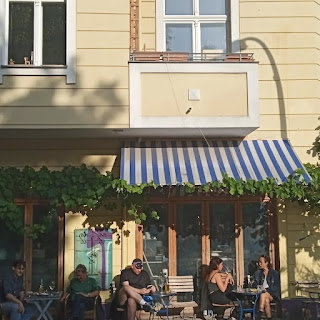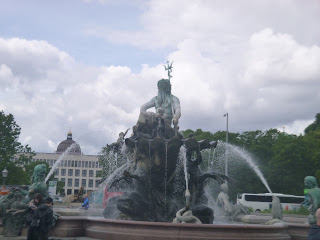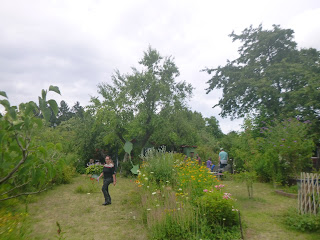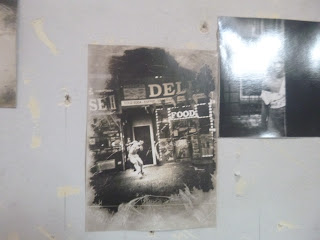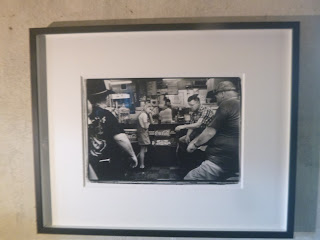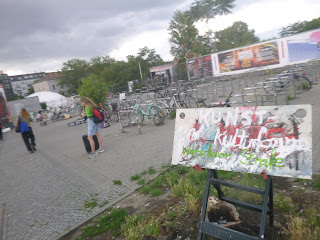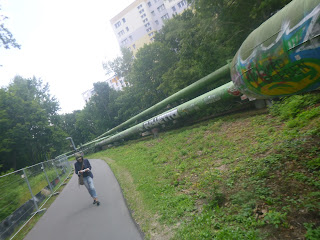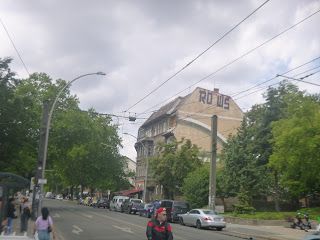Berlin Diary/ Book Talk On Activism, Friendship and Fighting at Hopscotch/ AGIT in Berlin, July 15th and other adventures between Helsinki and Brussels
Thank you for coming today.
Thank you to Siddhartha and Hopscotch Reading room, the coolest bookstore in Berlin, named after the surrealist novel of the same name by Cortázar. Buy a book or a zine everyone.
I’ll talk a little bit, read a little bit, talk some more, you can ask a few questions, we can have a big Berlin conversation and go out afterwards, not necessarily in that order.
Thank you to Caroline here, who sat for one of the first of the interviews for this project, unpacking bits and pieces of our messy history.
Thank you to Berlin, the city of friends, where it's not uncommon to make a new round of comrades at a Saturday dance party.
It's an honor to be here, giving a reading in the ancestral home of my father’s best friend Fred, their friendship was the subject of my first book on friendships, Rebel Friendships, a book that valorized friendships networks, instead of big organizations. It suggested there is something noble about the practice, something that seems ephemeral.
After it came out, a few people said it was missing something, a story about the conflicts that are always part of life in movements. Maybe they were right, I thought, contemplating another volume. I knew I wasn’t done with the topic.
I want to talk about a few images of friendship and its double.
I think of the great American poet Walt Whitman who envisioned a city of friends, among the sailors he met cruising the Brooklyn Navy yard and the waterfront, the men he met on shore leave, with whom he sang the body electric, the strangers he valorized, learning from them, writing about them. This was a major influence on his life. He wanted universal friendship. Yet in his lifetime he saw those same men engage in draft riots over the US Civil War, acknowledging the social and economic tensions that fueled the riots.
It was a little like Walter Benjamin here in Berlin, he wanted Socialism, he got national socialism.
Or in the US in my lifetime, we wanted civil rights advancements, a first black president, followed by the first women, but we got a xenophobic bigot hell bent on setting back civil rights, fighting immigrants, and birthright citizenship.
I think about the cello player in Sarajevo performing as the city was under siege and Susan Sontag staging waiting on Goddot there as we waited for aid. And violence erupted between friends and neighbors in cosmopolitan Sarajevo, the Mostar Bridge blown up, and Srebrenica under siege from April 1992 to July 1995. On the 30th anniversary of the Dayton Peace accords, these moments of neighbors fighting neighbors are worth recalling, wondering what happened? Was reconciliation really possible, wondered our friend Alessandra the night before. Maybe this was where all this nationalist shit really started.
We don’t choose the circumstances we live in. We choose what we do with those circumstances, we choose how to respond, to connect. For Whitman, it was about creating that city of friends, nursing the sick in the Civil War, for Sontag it was about calling out aid, highlighting the siege.
I can speak of our experience in the US. You want something and start to watch it fall apart, or you strive for it, battling for it. Fights over tactics emerge.
For me, it's always been about the friends in the streets we see, that make going to the demo fun, the comrades that become family. Caroline and I met at a demo.
I spent a year in Berlin on my sabbatical, speaking with everyone I met about the conflicts we experienced, tracing a zig zagging line from Sarajevo to the US, between Berlin and Brooklyn.
And I tried to edit this book. It was the hardest book I ever wrote. It's about the friends and our messy contradictions, and conflicts. But also our glories and greetings and salutations.
The book begins with an epigraph from Assata Shakur.
“One of the best things about struggling is the people you meet. Before I became involved, I never dreamed such beautiful people existed. Of course, there are some creeps, but I can say without the slightest hesitation that I have been blessed with meeting some of the kindest, most courageous, most principled, most informed and intelligent people. . . . [They] are my friends and comrades.
These friendships really begin in the streets. …
…
So, what are the lessons?
Talk with each other.
Listen.
Love each other or die, as Auden said during WWII, before he renounced the poem, “September 1, 1939” after it was published.
Still, friendship has changed and so have we.
Yet, how do we allow difference?
All too often the old Protestant scold, the wagging finger re-emerges.
All too often, we are not inclusive. Give people grace. There are gonna be different times for different people and friendships.
The rest of the talk built on the same frameworks as the others. But telling the story in Berlin changes the dynamics. Friends from the Freie Universitat were there, as were many of the usual subjects and other new comrades, adding to a conversation about our changing world, with Trump and the US as less reliable partners, many are not quite ready to give up on us. Others are, others laugh at our predicament. I think Macron should win the Nobel Prize for engaging Trump the whole time, said one friend. But US soft power, the global AIDS fund that Bush supported, that stuff mattered. And Trump has shattered it. Still AIDS activists are pushing back to save it, noted another friend.
Emily Bass wrote:
Discussing embodied inequality and geography, the streets of Berlin that are ripe for street ethnography, and the anxieties about the Alternative for Deutschland, dealing with the world, insecurities about the present, about the past, memory, history, questions about reconciliation, difference, it was a wonderful conversation and reading for the friendship book at AGIT, a community space on Nansenstrasse 2. Friends from school, our Berlin buddies, many new people came. Lots of good conversation about how to cope with differences. No one wants litmus tests for friendship. It's still better to have the conversation. We’re all part of capitalism; everyone is complicit to come degree. First a reading, then chit chat on the sidewalk, then off to the pub, out for döners, and catch up with the USA.
A few highlights / journals from our first two weeks away.
Berlin Diary, July 1
Off to see Mom, say goodbye for a bit, and then make our way to JFK, where I posted the notes: On the road again, Berlin buddies, see you soon. Join us July 15. Cards and smiles, getting away from the crazy usa for a few weeks. Playing cards with the many faces of baby c. See you on the other side. Gonna miss u. Xo
July 2
Back in Berlin for the first time in six months, it all feels familiar but strange. We arrived in the afternoon after leaving around 1 am, eastern time. Walking along Warschauer straße, a scooter spills out, father and daughter careening through the streets. Around 12 years old,she appears ok. He's rattled. The world is. Gorgeous people in cafes and spätis, the sun going down on Friedrichshain, the smell of the linden trees in the air, a young woman in a t shirt that says 'over worked underfucked', it's hot out, the sounds of the trains in the distance, glad to be here.
July 3/4
Jarno wanted us to visit him.
And we agreed before realizing it was immediately after getting to Berlin.
Sometimes I lose myself in travel, pieces disappearing, phones, memories, people, places lost, left on the plane, behind, unable to connect, fearful, not quite sure if its possible to get back, if anyone will even be there when you return.
Still, met Jarno and James, spent the day exploring Southern Finland, stopping at the Pyynikki observation tower, driving through the gorgeous countryside, listening
Jean Sibelius' finlandia, his homage to his country's liberation
"My country's skies are bluer than the ocean,
And sunlight beams on clover leaf and pine.'..
Driving past the cathedral, the Hartman House, deep into the woods, to a cabin, where we cooked, enjoyed the hot country sauna, and hopped into the Kustavi sea that flows into the Baltic sea. Many call it, “The NATO Sea.” The drive from Helsinki to St Petersburg is not even five hours. At dinner,our hosts recalled one of their grandparents who beat back the soviet invasion of WWII. 'He never talked about it until the very end of his life when he shared the story, just before he died.' The fear that another invasion is coming is very real in the region... NATO remains vital here. The Finland-Russia border is a 1,340 km long international border. It's also the external border of the European Union and NATO. You feel it here. The people talk about it. They speculate about invasions, recalling past wars with Russia during World War II: the Winter War and the Continuation War. We talked about this all night, in between trips to the spa and into the ocean, hot cold hot cold, repeat, repeat, repeat...
July 5
Walking back through Berlin, the sound of the beats filled the air coming out of the train, people out, with their beers, Met Baby C and made our way out to Kotti down along the water to Admiralbrücke, past the people out playing music,singing, taking in the summer feeling, a bite at Il Casolare, yummy Italian food, meeting friends, making our way to Sameheads, in Richardstrasse 10; Neukölln; dancing in the basement. Chatting about the strange dynamics of modern living, the technology which doesn't seem to help, the people we run into, the coincidences, the slip ups, the errors and foibles, the habits and hopes. All those feelings and sensations. Alive on a summer evening in Berlin.
July 6
Strange day. Berlin's super hot right now. I walked out into the day. People were up and about in their Sunday club going best, men in black skirts, women black boots and tight shorts. I stopped by Stef's open studio near the Südkreuz s bahn. On the way there, I got a call from a friend, whose roommate was crashing hard, with a panic attack after not getting enough sleep, too many drugs. "just remember you are a sentient being on the planet earth," I found myself saying. Get some rest. Breathe. Stef's open studio was dazzling, the light of the day pouring through repurposed objects of urban waste. We talked about the attacks on cultural funding in Berlin, and a demo on Tuesday. The many Berlin's arrived at Sisyphos Nightclub, found dance floors of house, techno, disco. As the inside set ended, everyone roared in applause for the DJ, like she was a star at the symphony. A final surprise with a live Mexican punk polka band delighting us. Dancing into the night... On the tram back home, people roared with laughter. Wondering about those back home. Alarms ringing. Deep into sleep. Not sure what was happening at home, worried.
Jana tells a story about a man in her neighborhood who used to play bob marley songs on her block every day, earphones in his head, he was oblivious to his noise.
He comes every day, oblivious to his disturbance. Neighbors scream at him, take videos. Jana runs down in tears saying he’s ruining her life. He says I'm spreading love. She says she may have to move. The next day, she’s eating at her coffee shop. He comes to sing. The waiter comes to ask how the food was. She says it's fine. But he’s here. The waitress says he’s fine, angry. The next day, she sees him, thinking this is her time to speak with him. This is her moment. She says we have to talk to him. They sit down and she talks with him. I was thinking about your tears all day, he says to her. They speak. Your tears last week showed me something, he told her. And he never came back. When they actually talked, the problem went away. A lesson for many of us, paying attention to the lessons of friendship and its many vicissitudes.
July 7
Dinner with Kai
Last summer, we stayed in Neukölln. It was great going back, walking along Mainzer Straße towards Alaska Bar, to meet Kai, our friend here for a bite, to the Sandman, for Chicago blues, through Hermannplatz, thinking about rath and charlotte babylon berlin... taking the trains the wrong way on our way back home. That’s what it felt like going the wrong way, trying to get back home.
July 8th
I met Stef for a Demo at Alexanderplatz. Walking through the city, you feel the same tensions we know in the US. The sense of a drift, a tilt, a welfare to warfare state. I met friends at a demonstration against the new mayor over the cultural budget cuts, essentially hiring more cops and cutting funding for culture. "Like the US," I said to one friend. "Well, not that bad," she noted. Of course the US is now creating its own concentration camps. Says one report, “Last week, Congressional Republicans passed a heinous budget bill that cuts Medicaid spending by over $1 trillion and Medicare by $500 billion in order to give huge tax cuts to the ultra-wealthy, big corporations, and special interests. Another beneficiary of the murder bill is ICE -- the unregulated Gestapo-like force that is abducting undocumented and documented people alike with no due process. The bill allocates $45 billion for immigration detention centers, as well as about $30 billion to hire more ICE personnel, for transportation costs, and to maintain ICE facilities. When we talk about immigration detention centers and facilities, we are talking about for-profit concentration camps like "Alligator Alcatraz" in Florida.” We got arrested fighting the big horrible bill. Berlin's response to the cultural cuts, is described by Caroline Whiteley, who writes:
Back home for a bit and out to the Neue Nationalgalerie, looking at Yoko Ono and Gerhard Richter. Full of mirrors, his work asks that we look at ourselves, wondering if we can reflect on a world that created such horrors, concentration camps, now and then. Says the Neue Nationalgalerie.”The central work of the exhibition is the cycle "Birkenau" (2014), consisting of four large-format, abstract paintings. It is the result of Gerhard Richter's long and profound exploration of the Holocaust and its depictability. The works are based on four photographs from the Auschwitz-Birkenau concentration camp, which the artist transferred to four canvases using charcoal and oil paint, and then gradually painted over in an abstract manner. With each layer of paint, the painted original disappeared slightly until it was finally no longer visible. The work also includes a large, four-part mirror, placed opposite the four Birkenau paintings, creating another level of reflection.”
I was there at the wrong time, missing the Surrealism show, which will take place in the fall.
After the show, I met Raoul and Andreas, having a beer in the fun.
Ahh Berlin.
July 9th
Wrote most of the day, before taking the trams to meet Nichlas and Ivonne in Neukölln, talking about Georgia, catching up on stories from school, setting into Berlin, research, history.
July 10 and 11
The ridiculous travel continues. Onward to Brussels, where the Surrealism show had already happened. “Bozar is celebrating 100 years of surrealism with an exhibition on Belgium’s famous avant-garde movement spanning no less than 60 years. 1924: as in Paris, surrealist activities also start in our country with bold pamphlets by artists including poet Paul Nougé, who guides this exhibition. Belgium’s quirky surrealists go beyond the purely aesthetic – they want to transform the world with their subversive art. In Histoire de ne pas rire, we pay extra attention to their international interactions, political-historical background, and important women artists. Includes works by Paul Nougé, René Magritte, Jane Graverol, Marcel Mariën, Rachel Baes, Leo Dohmen, Paul Delvaux, Max Ernst, Yves Tanguy, Salvador Dalí, Giorgio De Chirico, and many others.”
Walking through the streets of Brussels, the sites, the conversations are many. A kid says hi. A couple strolls out of the train station. A group sits outside in the sunshine. James talks about labor markets, referring to a story in the guardian. “Jobs whose value depend on human input – such as sports coaches, politicians, sex workers, ethicists – will endure but even they will face competition from machines” That leaves three things I can advise the kids to do ... He laments as day turns to night.
July 12
Woke up in Brussels, walking down Ave Louise on a gorgeous day, taking in stained glass and street murals, art deco and a late night bar, the streets of Brussels continue to intrigue.
Rave the Planet was taking place in one corner of Berlin.
“After the end of the original Love Parade in the capital, its founder Dr. Motte is bringing the successor Rave the Planet back to Berlin. Rave the Planet is a unique symbiosis of demonstration and rave. Under the motto "Our Future Is Now", the participants of the new Love Parade are standing up for love, peace, friendship, solidarity, diversity, respect, music, community service and a sustainable future. The organizers' demands include the recognition of electronic music culture as a cultural asset to be protected, the abolition of dance bans and the protection of cultural venues such as clubs.”
We were going to another.
Golden Gate is a compact little club formerly underground herewith a sofa, DJs spinning dance music, plus art exhibitions, located beneath the S-Bahn arches near Jannowitzbrücke station
n in Berlin-Mitte, specifically at Dircksenstraße 77-78, 10179 Berlin. Back in Berlin after a couple of days visiting friends in Brussels, met friends at a party and went to golden gate. Here are post dancing shots at Golden Gate and later at Warschauer Straße, where people were finding their way home from nights in clubland, as well as they could. A full day in the life, a few hours earlier walking through Brussels on the way back to the train station... Lots of movement and conversations about what the fuck is happening in the USA. Let me buy you a shot, said one dancer. No, I should buy you one. Strange days. Complicated emotions.
July 13
Baby C and I and a few pictures at an exhibition, exploring favourite places in Berlin.
Woke up late, made our way to the fifth Berlin Britzenale. After three editions in the allotment garden “Morgentau e. V.” and one stop in the Urban Forest Garden Britz, the Britzenale is now moving to a new location. With only 24 plots, the exhibition takes place in one section of the “Zufriedenheit” allotment garden, which offers a compelling setting for the Britzenale for many reasons – including its distinctive landscape. The terrain is still visibly shaped by the last Ice Age and is unusually hilly. As a result, the often rigid grid structure typical of allotment gardens becomes more organic here. At the same time, “Zufriedenheit” borders directly on the Kienpfuhl nature reserve. In this area, two differently interpreted natural environments meet – forming the basis for the artistic and curatorial research of the fifth Berlin Britzenale. As an approach to the fifth Berlin Britzenale, the method of mapping has been central. The term is used synonymously with identifying topics and discourses and is understood as the practice of collecting, visualizing, and connecting information and experience. These form a series of site-specific interventions throughout the duration of the Britzenale, each revealing different facets of the garden.
And then off to the finissage for TIME Moving & Storage. Fotos von Michael Ackerman at Verwaltethaus in our old neighborhood. Our favourite art space in Berlin, it was a thrill to see this elegiac black and white photograph of New York and Berlin in the old cemetery. Back home for some Italian food and rest.
July 14th
From east Germany to neo Nazis that's the book, says baby c, walking with me out to Berlin Lichtenberg to Rosa Luxemburg's grave. Different people argue she isn't really there. Still, the plaque at Friedrichsfelde, a socialist cemetery, says she's buried there along with the other social revolutionaries... Including Karl Liebknecht, her co revolutionary. Andres later met me for a stroll through Weißensee Cemetery. Jüdischer Friedhof Weißensee, looking for the grave of Margot Friedländer, a Holocaust survivor who dedicated her life to sharing her story and promoting remembrance, passed away on May 9, 2025, at the age of 103.
Met Alyssandra at Jules B-Part Café, a beer garden across town. We talked about Sarajevo and Italy and times when Berlin hits too hard, becomes a little jittery, a little too buzzed, too drugged, too much partying, not enough sleep. It's not the same when you are not on sabbatical, but you live here, she tells me. It's true, I think, thinking about my friends who’ve felt some of the peeks and valleys, pushing the edges, not enough sleep, too much.
And joined Caroline for a late night outdoor screening of Cabaret, everyone’s favorite Berlin musical. The cast for the music, Cabaret, opened with the creepy Nazi Youth song, “Tomorrow Belongs to Me.” We were not sure what to think until the cast member talked about a children's song that led Germany into a cataclysm. Over the last 21 years, the show has become a sort of rally cry against fascism, she said.
In the states, there are protests everywhere; restore our democracy, say the signs.
Michael Mensor, a friend in New York, posted a note about the new McCarthyism taking hold in the US.
“Late last month 4 part time colleagues of mine at Brooklyn College with top notch teaching evaluations and who had been reappointed to teach in the Fall were terminated without explanation. What was first regarded as puzzling then became deeply concerning since the only common feature among them was not low enrollments but pro-Palestine political activity. As it happens, tomorrow, the Chancellor of CUNY will be testifying in front of the House Education and Workforce Committee along with the leadership from the Cal system and Georgetown. (Full statement from the union is below.). This is it folks, the budgets are being chaotically and nonsensically and offensively cut, and now faculty are being fired for political activity and with no transparency. As someone who does Environmental and Climate Justice research and work and is watching EJ groups be targeted and faculty funding cut as well, we have to stop this, it's not acceptable, it's OUR money, we need strong public institutions to defend the public good and the planet, which is all of us.
from the PSC-CUNY
On June 26th, the PSC’s Delegate Assembly unanimously passed a resolution In defense of academic freedom and against the retaliatory firing of CUNY faculty. The resolution was introduced in response to the unexplained, irregular firing of four Brooklyn College teaching adjuncts in what appears to be retaliation for their lawful political expression outside of the classrooms. No reasons were provided for the non-reappointments and the adjuncts’ department chairs were not notified in advance. What the four instructors have in common is their public protest against Israeli policies and advocacy for Palestinian rights. PSC President James Davis said, “the situation has all the appearances of an ideological purge” in a June 30th letter to the Chancellor. Both the resolution and the letter condemn the retaliatory dismissal of the faculty members and demand their immediate reappointment. The University Faculty Senate Executive Committee also communicated concern to the Brooklyn College president about non-reappointments “due to extracurricular political expression,” and reminded her that AAUP governance principles state that in “questions of faculty status, as in other matters where the faculty have primary responsibility,” presidents should “concur with the faculty judgment except in rare instances and for compelling reasons which should be stated in detail."






